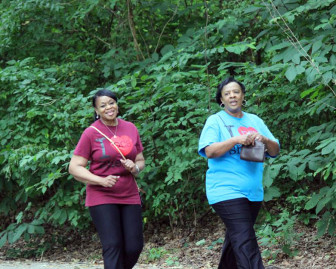By its very nature, taking care of oneself is an individual endeavor. But child welfare and social service organizations also have a role to play in making sure their workers are practicing good self-care, professionals say.
“[Self-care] is really hard … to practice, like anything,” said Nancy McDaniel, director of consultation and capacity building at the Butler Institute for Families. But it’s especially hard without external supports to reinforce it, she said.
Self-care refers to activities and practices that social workers can do to reduce stress and improve well-being. High turnover rates among child welfare workers have drawn more attention to the importance of self-care in the last 10 years, McDaniel said.
Because of the emotional and physical demands of the job, child welfare workers are especially vulnerable to burnout — which comes from heavy workloads — and compassion fatigue, which results from working on a daily basis with people who have been traumatized and victimized.
Self-care is a solution to both problems, but McDaniel said not enough workers are practicing it.
“In those helping professions, the [workers’] mindset is helping to care for others instead of themselves,” she said.
That’s why it’s up to agencies and organizations to promote self-care and support workers who need it.
That effort starts from the top, said Kathleen Cox, an associate professor in the school of social work at the California State University, Chico.
“It’s important that agencies support supervisors or hire supervisors that have an understanding of self-care and supports that in their employees,” she said.
Employers that offer flex time, recognize employee success and establish rituals of resiliency can foster an atmosphere of self-care, she said.
In Shelby County, Tennessee, the Department of Children’s Services (DCS) has begun to emphasize some of those values. Altered work schedules have resulted in a more autonomous and engaged workforce. Longer breaks allow for fitness activities during the day. And awards — sometimes in the form of baked goods — make employees feel appreciated.
[Related: Social Work Education Key to Retaining Foster Care Workers, Advocates Say]
“I’m gonna go bankrupt buying butter,” joked regional administrator Merlene Hyman, who likes to reward employees with sweet treats.
Although it seems like a small thing, those small things matter to staff, Hyman said. And they seem to be paying off.
Shelby County, which includes Memphis and is the largest of the state’s 12 DCS regions, has the lowest rate of turnover during the first year of employment in Tennessee, Hyman said.
It also has the state’s highest participation in an altered work schedule program that allows employees to telecommute on certain days or work hours that better suit their schedule.
“Since we’ve instituted [the altered work schedules], people feel more autonomy in setting their own schedule,” Hyman said. “It’s not such a drag.”
The changes began in 2012 with an assessment of culture within the agency by the Annie E. Casey Foundation and the Butler Institute, Hyman said. The results showed that front-line workers wanted more support from upper management and to have more of a voice in agency decisions.
Opening the lines of communication has been “the biggest piece” in working toward better self-care, said Jamil Matthews, a team leader in Shelby County.
“That has given some of those case managers the feeling that their voice is important,” he said.
And the more support and attention they feel they’re getting within their agency, the more they care about themselves and the families they’re working for, he said.
Matthews himself feels less stressed since the changes were put in place, “simply because we’re closer.”
“I feel like I’m more supported,” he said. “And I know if I do have a concern, I know it’s going to be heard.”
Shelby County is not a utopia, Hyman said. One perk, such as telecommuting, can lead to stress in another area. It does not solve the crises of the job or the community.
The goal is to make Shelby County a place where people can feel good about coming to work every day, despite what’s going on.
“We recognize the humanity in this job, not just in the families we serve,” Hyman said. “Staff is my first customer.”
Self-care resources for youth workers
- University of Buffalo School of Social Work’s Self-Care Starter Kit
- The National Child Traumatic Stress Network’s Self-Care Inventory
- Ohio Child Welfare Training Program’s Caseworker Readiness Activity
- National Child Welfare Workforce Institute’s resources on Incentives and Work Conditions
More related articles:
Does Your Work Interfere with Your Life?
Compassion Fatigue Rampant in Youth Service Industry
The One Question Foster Care Workers Need to Ask Themselves



































